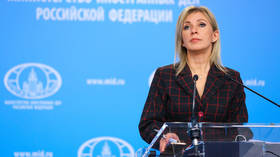More weapons for Kiev won’t change battlefield dynamics – Kremlin

The $61-billion defense package recently approved by the US Congress will not change the situation on the battlefield in Ukraine’s favor, according to Kremlin spokesperson Dmitry Peskov. Earlier this week, Russian Defense Minister Sergey Shoigu said that Moscow’s forces had seized an initiative in the Ukraine conflict.
On Saturday, the US House of Representatives passed the package valued at $95 billion, the lion’s share of which will go toward shoring up Ukraine. The Senate gave its thumbs-up to the legislation on Tuesday, with President Joe Biden expected to sign off on it on Wednesday. Several media outlets have reported that first batches of aid could be dispatched to Kiev within days.
Initially presented last fall, the package wallowed in limbo for months as Republican lawmakers blocked it in a drawn-out bid to squeeze concessions out of the Biden administration on US border-control policies.
Speaking to Russian media on Wednesday, Peskov stated that the “situation on the battlefield is too eloquent and unequivocal, but we never tire of repeating that all these new batches of weapons, which are likely ready by now, won’t change the dynamics on the front line.”
The Kremlin spokesperson also pointed out that Western media’s and officials’ narratives have “mutated” a lot over the past year. He explained that, while the general consensus in the West a year ago was that Russia’s defeat was imminent, this later gave way to warnings that the Ukrainian government could fall, and eventually that more weapons deliveries could prevent this outcome.
Peskov emphasized that the US government has effectively been funneling billions of dollars into its own military industrial complex all along.
Speaking at a meeting with top Russian commanders on Monday, Defense Minister Sergey Shoigu announced that Moscow’s forces had been making advances and have liberated several towns in Donbass in recent days.
He estimated Kiev’s losses at half-a-million troops since the start of the conflict.













